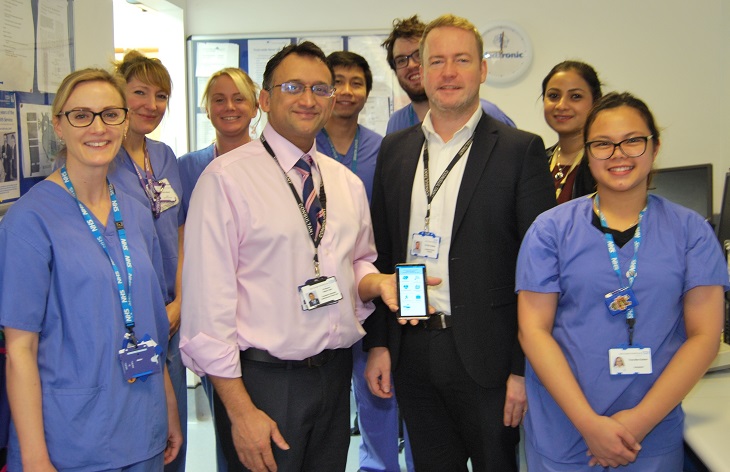An East Sussex patient has become the first person in the South of England to receive a permanent pacemaker which can communicate directly with a patients’ Android smartphone or tablet.
The pacemaker monitors the patient’s heart rhythm and, via a downloaded application on an Android smartphone, can communicate with doctors in the hospital. This remote monitoring into a patients’ daily living, eliminates the need for a dedicated bedside monitor or other remote monitoring hardware.

Professor Nikhil Patel Consultant Cardiologist holding smartphone with
Dr Richard Veasey Consultant Cardiologist with some of the Cardiology team
Professor Nikhil Patel, Consultant Cardiologist who performed the procedure with Dr Richard Veasey said: “We are delighted to be the first in the South of England to offer this new technology. Remote monitoring of abnormal heart rhythm data via the app on the smartphone, allows the patient to stay connected with the hospital and will reduce the number of visits to hospital. It is a convenient and safe way of monitoring our patients’ heart rhythm, allowing them to continue living their life with the assurance of feeling secure and connected.”
Heart mobile app includes:
• Transmission History: Provides patients information about transmissions that have been sent to doctors, as well as confirmation when transmissions are received by doctors.
• Vitals Tracking: Allows patients to record weight, blood pressure and heart rate in the app and track these measurements over time.
• Battery Longevity: Displays the estimated remaining battery life of patients’ pacemaker.
• Symptom Journal: Allows patients to record symptomatic events which can be reviewed with their doctors during clinic visits.
• Device Information: Displays device implant date, heart device name, model number and serial number – as well patients’ clinic information.
• Education: Offers helpful information about living with a heart device.
• Physical Activity: Provides information about patients’ activity levels. The app uses data from patients’ heart devices to create daily, weekly and monthly views of physical activity.
